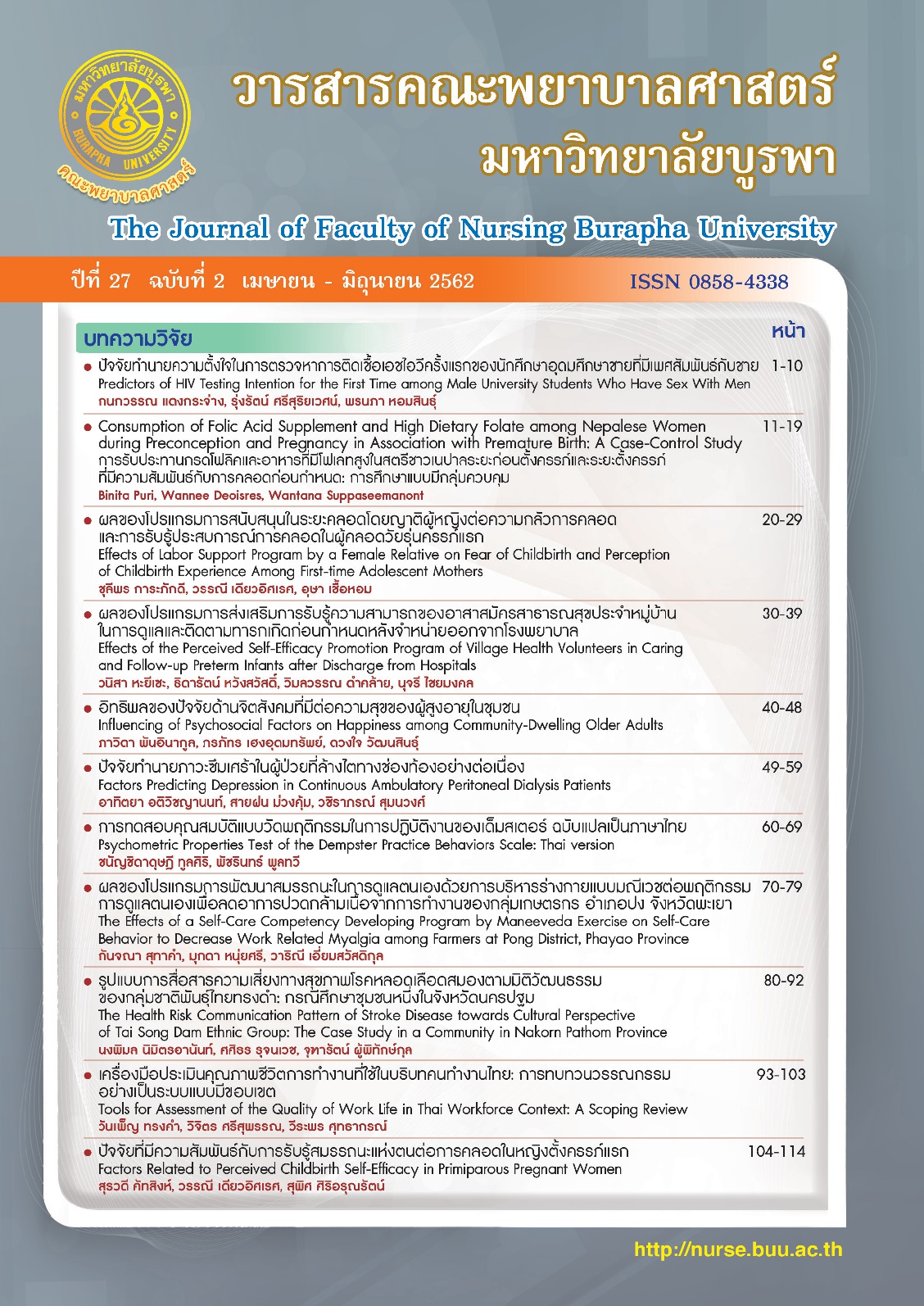Consumption of Folic Acid Supplement and High Dietary Folate among Nepalese Women during Preconception and Pregnancy in Association with Premature Birth: A Case-Control Study
Keywords:
Folic acid supplement, high dietary folate, , preconception, preterm birthAbstract
Abstract
This case-control study aimed to examine consumption of folic acid supplement and high dietary folate among Nepalese women during preconception and pregnancy in association with preterm birth. A convenience sampling technique was conducted to recruit 84 mothers who delivered 42 preterm and 42 full-term babies at a hospital, Kathmandu, Nepal from March to May 2018. Research instruments included 5 self-reported questionnaires. There were a demographic questionnaire and the consumption of folic acid supplement and folate diet during preconception and pregnancy questionnaires. Information about preterm births was obtained from medical records. Descriptive statistics, t-test, chi- square test and multiple logistic regression analysis were computed for data analysis.
Results showed that during preconception and pregnancy, women who consumed more on high dietary folate were less likely to have preterm births comparing to those who consumed less (OR=.20, 95%CI =.06-.67 and OR= .53, 95%CI= .32-.92, respectively). Consumption of folic acid supplement during preconception did not associated with preterm birth. However, women who consumed more on folic acid supplement during pregnancy were less likely to have preterm birth comparing to those who consumed less (OR= .53, 95%CI= .32-.92). These findings support previous studies that having more consumption on high dietary folate during preconception and pregnancy, as well as folic acid supplement during pregnancy could reduce the risk of preterm birth.
References
Alfonso, V. H., von Ehrenstein, O., Bandoli, G., & Ritz, B. (2016). The influence of pre-natal supplement initiation on preterm birth among majority Hispanic women in Los Angeles county: The role of nativity. Maternal and Child Health Journal, 20(9), 1861-1868.
Bhandari, S., Sayami, J. T., Sayami, M., Kandel, B. P., & Banjara, M. R. (2014). General health status of women of reproductive age in Nepal. Journal of Nepal Health Research Council, 12(26), 8-13.
Cha, E. S., Kim, K. H., & Erlen, J. A. (2007). Translation of scales in cross-cultural research: Issues and techniques. Journal of Advanced Nursing, 58(4), 386-395.doi:10.1111/j.1365-2648.2007.04242.x
Gautam, P., & Dhakal, R. (2016). Knowledge on preconception care among reproductive age women. Saudi Journal of Medical and Pharmaceutical Sciences, 2(1): 1-6
Grieger, J. A., Grzeskowiak, L. E., & Clifton, V. L. (2014). Preconception dietary patterns in human pregnancies are associated with preterm delivery–3. The Journal of nutrition, 144(7), 1075-1080.
Health Canada (2008). Nutrient value of some common foods. Retrieved from file:///Users/macbook/Downloads/nutrient-value-common-foods.pdf
Kc, A., Wrammert, J., Nelin, V., Ewald, U., Clark, R., & Malqvist, M. (2015). Level of mortality risk for babies born preterm or with a small weight for gestation in a tertiary hospital of Nepal. BMC Public Health, 15, 877. doi:10.1186/s12889-015-2232-1.
Li, Z., Ye, R., Zhang, L., Li, H., Liu, J., & Ren, A. (2014). Periconceptional folic acid supplementation and the risk of preterm births in China: A large prospective cohort study. International Journal of Epidemiology, 43(4), 1132–1139. https://doi.org/10.1093/ije/dyu020
Liu, L., Oza, S., Hogan, D., Perin, J., Rudan, I., Lawn, J. E., & Black, R. E. (2015). Global, regional, and national causes of child mortality in 2000–13, with projections to inform post-2015 priorities: an updated systematic analysis. The Lancet, 385(9966), 430-440.
Liu, X., Lv, L., Zhang, H., Zhao, N., Qiu, J., He, X. & Lerro, C. (2016). Folic acid supplementation, dietary folate intake and risk of preterm birth in China. European journal of nutrition, 55(4), 1411-1422.
Mantovani, E., Filippini, F., Bortolus, R., & Franchi1, M. (2014). Folic acid supplementation and preterm birth: Results from observational studies. BioMed Research International, Volume 2014, Article ID 481914, 8 pages http://dx.doi.org/10.1155/2014/481914.
Nisar, B. S., Dibley, J. M., & Aguayo, M. V. (2016). Iron folic acid supplementation during pregnancy reduces the risk of stunting in children less than 2 years of age: A retrospective cohort study from Nepal. Open Access Human Nutrition Journal, 8(67).
Paudel, P., Wing, K., & Silpakar, S. K. (2012). Awareness of periconceptional folic acid supplementation among Nepalese women of childbearing age: A cross-sectional study. Prev Med, 55(5), 511-513. doi:10.1016/j.ypmed.2012.09.001
Sharif, M. E., Mohamedain, A., Ahmed, A. A., Nasr, A. M., & Adam, I. (2017). Folic acid level and preterm birth among Sudanese women. Maternal health, neonatology and perinatology, 3(1), 25.
Sengpiel, V., Bacelis, J., Myhre, R., Myking, S., Pay, A. S. D., Haugen, M., & Vollset, S. E. (2013). Folic acid supplementation, dietary folate intake during pregnancy and risk for spontaneous preterm delivery: a prospective observational cohort study. BMC Pregnancy and Childbirth, 14(1), 375.
Tabachnick, B. G., & Fidell, L. S. (2007). Using multivariate statistics (5th ed.). Boston, MA: Allyn and Bacon.
World Health Organization. (2012). Daily iron and folic acid supplementation in pregnant women: Guidelines. Retrieved from http://apps.who.int/iris/bitstream/10665/77770/1/9789241501996_eng.pdf
World Health Organization. (2018). Preterm birth, Key facts. Retrieved from http://www.who.int/news-room/fact-sheets/detail/preterm-birth
Zheng, J. S., Guan, Y., Zhao, Y., Zhao, W., Tang, X., Chen, H., & Huang, T. (2016). Pre-conceptional intake of folic acid supplements is inversely associated with risk of preterm birth and small-for-gestational-age birth: a prospective cohort study. British Journal of Nutrition, 115(3), 509-516.





